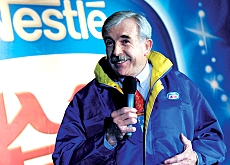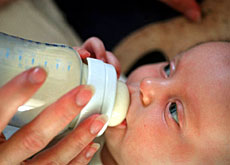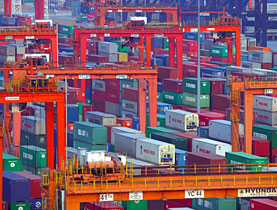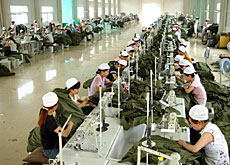Nestlé says “no room for mediocrity in China”

An executive of Swiss food giant Nestlé tells swissinfo about the challenges of doing business in China - which now claims to be the world's sixth-largest economy.
Josef Müller, head of Nestlé China, says that although the country has the single largest customer base, companies doing business there have to cope with the rapid speed of change.
“China is a cluster of many, many markets in itself,” he told swissinfo on the sidelines of a conference in Zurich on the opportunities and pitfalls of doing business in China.
He explained that Nestlé opened a sales office in Shanghai in 1908, so it was no stranger to globalisation even close on 100 years ago.
swissinfo: What are Nestlé’s guiding principles in China?
Josef Müller: Like anywhere else, they boil down to a very few basics. If you make investments in a country like China, it is very clear to us that these must be in the interests of both China and the Chinese people, and our company.
Very clearly, it has to be a win-win situation for all parties concerned. If we go to China we are not going there to give lectures on what is right or wrong. We respect China, and its culture and values. Our focus is on people, consumers, customers, our products and our brands, and we have a very clear long-term, strong commitment to China.
swissinfo: You are Nestlé, you have clout. What opportunities do you see for Swiss small and medium-sized businesses in China?
J.M.: We have a sizable operation in China today but China is so big that everybody is small in China. The longer you are in China, the more you become very humble.
Having said this, whether it’s a small, medium-sized or a large company, one thing is exactly the same: There is no room for mediocrity in China. You have to offer value for money and this is the challenge. It’s the same for a large or a small organisation. For a large organisation, if you don’t do it right, the damage is just a little bit bigger.
swissinfo: Have you come across corruption during your time in China?
J.M.: There’s a lot of talk about corruption in China. I always wonder if corruption was invented only in China. I think this is something that doesn’t exist only in China. It’s just more talked about because China is so much bigger but I think corruption exists in many other parts of the world.
I myself have not been confronted with any corruption and we would not tolerate any such thing. We have our basic business principles that we adhere to. And my advice to everybody would be: Don’t get into corruption because otherwise you will not get out of it. There is a way of doing business without corruption in China and like anywhere else corporate governance and common sense must prevail.
swissinfo: Have you had problems with infringements of your patents?
J.M.: As regards counterfeit products, this does occasionally happen to almost everybody but again it’s not only in China… What is impressive for me to see is how the authorities take it to heart and we have a good cooperation with the government on these issues. Whenever something can be spotted and identified we take it up and the government takes corrective action.
swissinfo: Have you at Nestlé tried to help other Swiss companies to gain a foothold in China?
J.M.: We are not in the business of providing this service to other companies but I would say indirectly yes. I think sharing our experiences is a kind of indirect help that we provide.
If we can give inspiration about doing business in China, if we can motivate people to see opportunities, I think we have helped many other companies and we will continue to do so.
swissinfo: What about your personal experiences?
J.M.: I think the Chinese people are wonderful people – open-minded, eager to learn, a “can do” attitude, move forward, not look backwards, have a better today compared with yesterday and have a better future compared with today – so a very optimistic, motivating and inspiring mindset. This is fascinating to be part of.
swissinfo-interview, Robert Brookes in Zurich
Nestlé’s Eagle brand was registered in Hong Kong in 1874.
The company opened a sales office in Shanghai in 1908.
It opened its first factory in China’s mainland at Shuangcheng, Heilongjiang province in 1990.
The company now has 19 food and beverage factories on 17 different sites.
There are currently 12,000 employees with an average age of 32.
China says it has overtaken Italy to become the sixth-biggest economy in the world.
Revised GDP for 2005 puts China just behind France.
But economists say in terms of per capita GDP China is ranked lower than 100th in the world.

In compliance with the JTI standards
More: SWI swissinfo.ch certified by the Journalism Trust Initiative



You can find an overview of ongoing debates with our journalists here. Please join us!
If you want to start a conversation about a topic raised in this article or want to report factual errors, email us at english@swissinfo.ch.